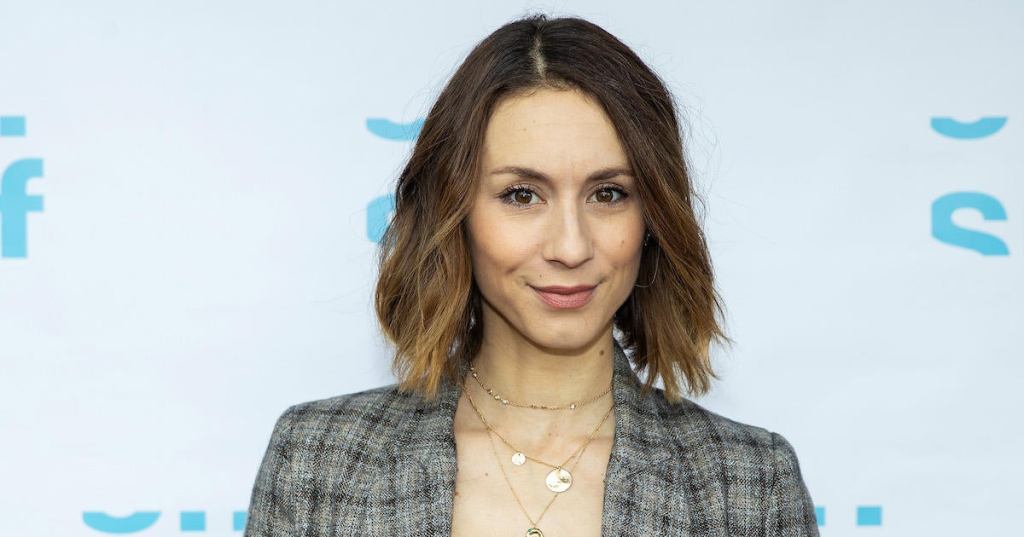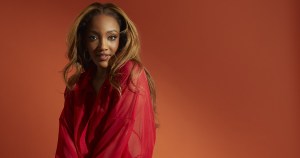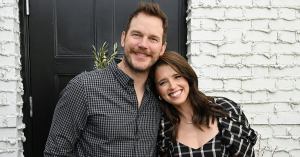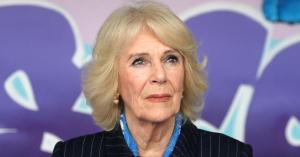Pretty Little Liars alum Troian Bellisario is shining a light on different birthing options in her new comedy film DOULA. The film chronicles Deb and Silvio, who are expecting their first child together after just a few months of dating. When their elderly midwife Penka dies unexpectedly, Silvio makes the hasty decision to hire Penka’s son, Sascha (Will Greenberg), as their live-in doula. Deb is unphased, sort of dragging along in her pregnancy as to tries to come to terms with how her life has already changed and how motherhood will further expand that. As she fights for her voice and gains control over the situation, Sascha’s unconventional style wins her over, while Silvio starts to feel like the odd man out. After a major blowup, Deb must choose between him and Sascha.
DOULA is the first feature film produced by Chris Pine and his new production company Barry Linen Motion Pictures. It’s currently available to rent or buy on all digital platforms. Popculture.com spoke with Bellisario about the role reversal in the film, navigating pregnancy and birth choice options, working on the project while pregnant, lessons learned, and the timeliness of the film in a politically charged climate amid the Supreme Court’s decision to overturn Roe v. Wade. Watch the full interview above and read below.
Videos by PopCulture.com
PC: How was filming during pregnancy, and how did the role impact your own birthing choices this time around, if any? Because I did read that you gave birth in a car to your daughter.
TB: That was not a choice [laughs]. I didn’t choose to give birth to her in a car.
Of course, you didn’t. If you did, that’s your right.
If you did, that’s your right. You know what I mean? You do you. But for me, it was really interesting being pregnant. I was pregnant for my second time, and I think it was really incredible because this whole film is just about validating a woman’s experience. It’s validating a woman’s experience in pregnancy, what she wants, what she needs, what her identity is, and how that’s shifting. And so for me to be pregnant while I was actually going through it, it was really giving me the sort of support and strength to question things in my life, or in my pregnancy that I was like, am I making this choice because I want to do this, or am I making this choice because I feel the pressure to be this way as a pregnant person? Am I making this choice because I feel like this is the only way to be pregnant? So it was really just validating and supporting of me going, ‘No,.’ There are so many ways that somebody can feel during this time in their life, and they’re all valid.
I’m glad that you touched on that, because pregnancy is such a major topic, and everyone has their own method of getting through it and birthing. This film hilariously touches on all of it. What did you learn while filming in regards to trying to do what you feel you want to do for yourself versus society or whatever the new trends are?
It was super interesting because I had always really, speaking personally, the idea of a home birth and a hospital birth is very, very fraught for me actually, because I know so many women who have chosen to have a home birth, and I know so many women who have chosen to have a hospital birth. And for me, I was caught personally in this in-between land where I was like, ‘Well, I want to be in my home and I want to do that. But I might not actually feel safe enough. I might feel like I also want to be in a hospital where if something goes wrong, I can have medical assistance quickly.’ And so, I was really kind of digging into why do I feel this desire to birth at home? Is it because I feel the pressure from momstagram to have a beautiful at-home birth? Or is it because I genuinely want that for myself and my baby? I was like, gosh, I feel so inundated by this picture of pregnancy that was put out in the world. And it was so cool to get to inhabit a character like Deb, who is like, “No, I don’t want to have a home birth. I want to go to the hospital.” And she was –
She was so funny.
It was so cool that she was actively up against this sort of fake woke man who was like, “No, have it the natural way.” And it was almost like her partner was speaking to her as this mom influencer kind of thing. And she is just so fiercely like, “No, no, no. My body, my choice, my birth. I’m doing this my way.” And she was fearless about it. So it really inspired me to try to advocate for myself in a totally different way. I learned a lot from the character of Deb.
Now, speaking of your character and your onscreen partner having this clash of power in terms of how the woman is going to give birth to their child, it was very interesting to see the role reversal because typically, the woman is usually the one in charge and coming up with all of the suggestions and their partner, husband – not always, but for the most part. And in some cases, they’re not as active as the woman and it’s like the woman feels like they’re on their own making all of these decisions. But in the case of your character, she was kind of overwhelmed with everything that she was up against with her partner. So it was funny to see a man really take charge in that way. Was it refreshing for you to play this role or to see that dynamic play out in a different lens on-camera for the first time? I’ve never seen it like that on camera before.
Yeah. It felt incredibly refreshing, and that’s why I love the movie so much because I think that so much of what Deb represents is a lot of the identity crisis that a woman can go through. You know, not all women go through it, but a lot of women can. When they are becoming mothers, it’s like, ‘Who am I anymore? You know? Do I just step gracefully into this time in my life where I suddenly am? Am I breastfeeding? Am I birthing vaginally? Am I getting a C-section?’ There’s just so many things that you’re supposed to have this very strong opinion about. And I love that there’s this woman that’s like, “I haven’t thought about this. And I don’t even … I’m barely interested in thinking about this. I have things that I love in my life and I have a way of doing things in my life and I want that.”
And so I just loved that there was a sort of atypical representation of a female in this role and that there were…that it was just showing that, again, there’s so many different experiences that people can have. Birthing partners, the people who are not carrying the babies can be overly involved. And the people who are carrying the babies can really struggle with their identity as a pregnant person. And so I think it’s really cool that we get something that I don’t think we’ve seen before in a film.
And this really puts birthing partners, doulas, those types of support people in the center. And there’s so much research now showing that doulas and midwives are really on the rise now with women choosing natural births versus the hospital option, if they can avoid that. Because in some cases they can’t, and some women have different complications. What research did you do, if any, in regards to all of that?
Well, I think I also love that about this film is that I think that one of the biggest jokes of the film is like, ‘Do you know what doula means?’ And I think that there’s a lot of people in the world who don’t know what a doula is or who don’t know what a midwife is. And they sort of just think like, ‘Oh, there’s a doctor,’ and then there’s nothing else. And I think what’s so important about birth workers and doulas is that they are there to advocate for the person who’s giving birth. And it is so important that we have these advocates because over many years, for many reasons, birth became a very, very disempowering place for women, particularly women of color, and it became overly medicalized. And we sort of took away…It is a major medical event, but we sort of took away the power from women who were giving birth and gave it over to the doctors to say, “These women are in peril, they’re scared. They don’t know what to do. You have to just handle them and their bodies.”
And I think what’s really amazing about a doula and about a story about a doula that’s so timely right now is that it’s about empowering the person who’s giving birth. It’s about empowering the woman to have autonomy over her body to say, “I want to give birth in this way. I don’t want to give birth in this way. I want to labor in this place. I don’t want to labor in this place.” And the cool thing is these are medically trained professionals. They are not going to put these women in danger, but they are going to make sure that their birthing experience is one where they are validated. Their choices are validated. And I just could not think of what is more important in a time like this than validating and empowering women. So, I’m all for birth workers.
That was actually going to be my next question, because I hadn’t actually seen any trailers or press regarding the film up until very, very recently. And I found that it was extremely coincidental that it came at a time where women’s reproductive rights are at the center of every conversation. So how do you think that this film falls into that – if you could expand upon what you’ve already said?
Yeah. I mean, again, I think it’s just about validation. I think this a film about a woman saying, “This is my body. This is my choice.” And she’s saying it up until this baby is outside of her. The thing that I love about Doula is there’s an argument at one of the climaxes of the film where she openly admits, “I didn’t want to have this baby in the beginning. I let you pressure me into this. And now you’re trying to control every aspect of it.” And Deb has to fight for her experience. And she doesn’t even know what it’s going to be like on the other side, when she says, “What if I don’t love this baby?” I think that it’s really wild that we are in this time and that we are really having to fight for women’s bodily autonomy.
And I think that this is a comedy where it’s meant to bring joy, it’s meant to bring laughter. But I also hope that it also brings an empowerment to women to say that everything about this deserves to be your choice, whether you choose to be a mother or not, and how you choose to be a mother or not. It is up to you. And I just think that that is so, so important for young women, for girls to see. I mean, I know that this is an R-rated film, so don’t have too young children watch it, but whenever they’re of age, I think it’s important because like I said before, we’re just validating women. We’re validating that pregnant women are sexual beings. We’re validating that they have wants and needs, and they are not just a vessel for a baby.
So, switching gears a bit, Chris Pine produced this film and it was his debut as a producer in the role. How was working with him? And what did you feel that he brought to a film like this with pregnancy at the center?
Oh my God. A whole lot of laughter, because it was hilarious. Chris and I have been very, very good friends for a very long time, and one of the best parts about this film other than him championing it, which was just an incredible thing for him to do, especially as his first step out as a producer, but that he just trusted everybody in the process. Chris is an A-list movie star. He has been on sets that have budgets I couldn’t even dream of. And he has an incredible reputation. He’s an incredible worker. And the fact that he would support his best friends in coming together to make a film directed by a woman, led by a woman about a woman’s point of view, just that he would only want to be a helping hand in that endeavor is just I think fantastic. And when he was on set, it was an incredible experience because I know Chris as a friend. I’ve never gotten to see him as a professional, and it was wonderful to work with him and see that he’s every bit as grounded and kind and supportive and loving in front of the camera as he is off-screen.
Obviously, fans loved Pretty Little Liars so much that a reboot is in the works. What about this show do you feel that made such an impact for a reboot to even be considered, and will you make an appearance of any sort?
I truly have no idea. I mean, I don’t know anything about the reboot other than it’s happening. And I don’t even know if Spencer Hastings is alive in this version of the universe. I genuinely have no idea, so I don’t know how that would work. But I think what people love about it is the friendship between the women. It was so cool. When I look back, making Pretty Little Liars was just such a wild experience because it was like being with your friends, and especially being young women, being in a situation where you’re not – It’s funny, there was a lot of, “Am I going to be killed or stuff?” on this set, but there was always a, like, “I’m supporting my friend.” It was about female friendship. And it was about these five women who were different in so many ways, but were also just in love with each other and lifted each other up. And I think that that’s really rare. I think that is what meant everything to the fans was just this friendship; that it wasn’t about women tearing each other down. It was about friends lifting each other up and loving each other.





